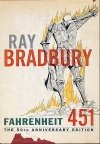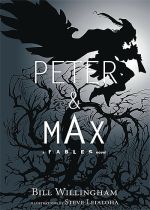Farenheit 451
I'm currently reading a book called Farenheit 451 by Ray Bradbury. It is a dystopian fiction about censorship and a conformist society where intellectuals are shunned. It was written around the 1950's and the setting closely resembles this time, the information age. Books are entirely illegal, and are confiscated and burned, in this story. It is considered as a dangerous weapon for the reason that they can cause discord. A well-read man can belittle another man who hasn't read anything. Two men can write a book on the same topic, but with varying opinions, can create confusion and split the society. Instead of learning from books, every people are equally feed with "facts" through their "walls" and "seashells" so each one knows no better than the other. Critical thinking and reasoning has also been removed from the individuals. The people are just taught "how to do it" but not "why they do it", and those who question "why" instead of "how" are being treated as odd, an outcast, and anti-social. The same treatment goes for the people who don't do what the norm does, like driving fast for example.
Books are entirely illegal, and are confiscated and burned, in this story. It is considered as a dangerous weapon for the reason that they can cause discord. A well-read man can belittle another man who hasn't read anything. Two men can write a book on the same topic, but with varying opinions, can create confusion and split the society. Instead of learning from books, every people are equally feed with "facts" through their "walls" and "seashells" so each one knows no better than the other. Critical thinking and reasoning has also been removed from the individuals. The people are just taught "how to do it" but not "why they do it", and those who question "why" instead of "how" are being treated as odd, an outcast, and anti-social. The same treatment goes for the people who don't do what the norm does, like driving fast for example.
In a way, I guess our society now is similar, though not entirely. While books are still being read by a lot of people, some do prefer watching Lord of the Rings in the "walls" (movies), because of the blond elf, rather than reading the book and digging its meaning. Some stare countless hours at their "walls" (flat-screen TV) watching silly shows without texture. Some listens to their "seashells" (iPod, portable radio) because most people does, but are oblivious to their context and meaning.
That said, this book is a very enjoyable and thought-provoking read. I'm still amazed of how Bradbury had predicted the flat screen TVs on the walls or the portable radios. Though I'm glad that he's wrong on his "book-banning future" aspect. Or is it that his book created a lot of Guy Montag, the protagonist in the story, in the last 50 years to prevent the "book-banning future" from happening?











0 comments:
Post a Comment